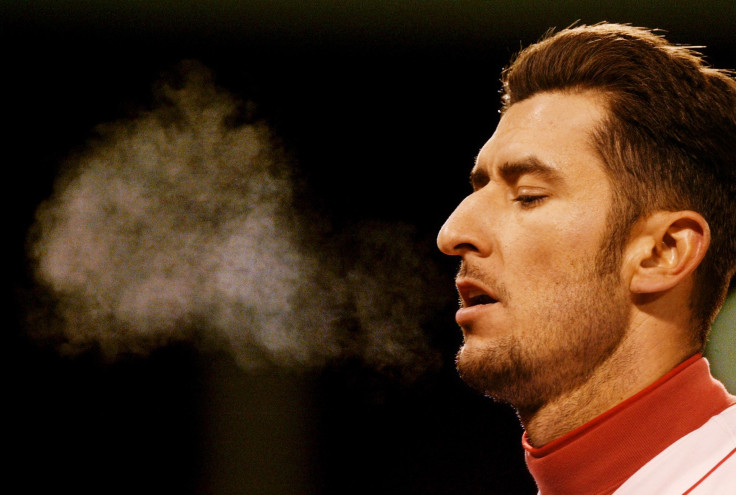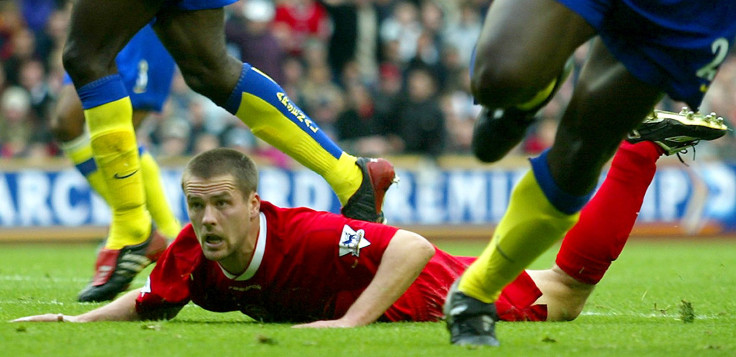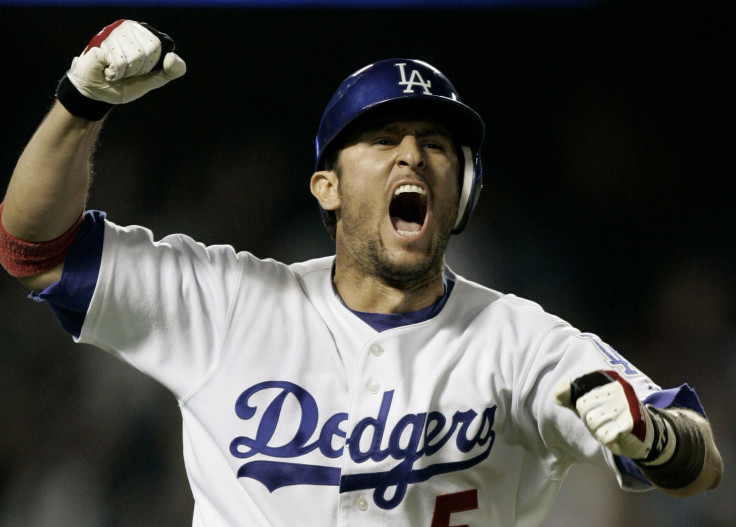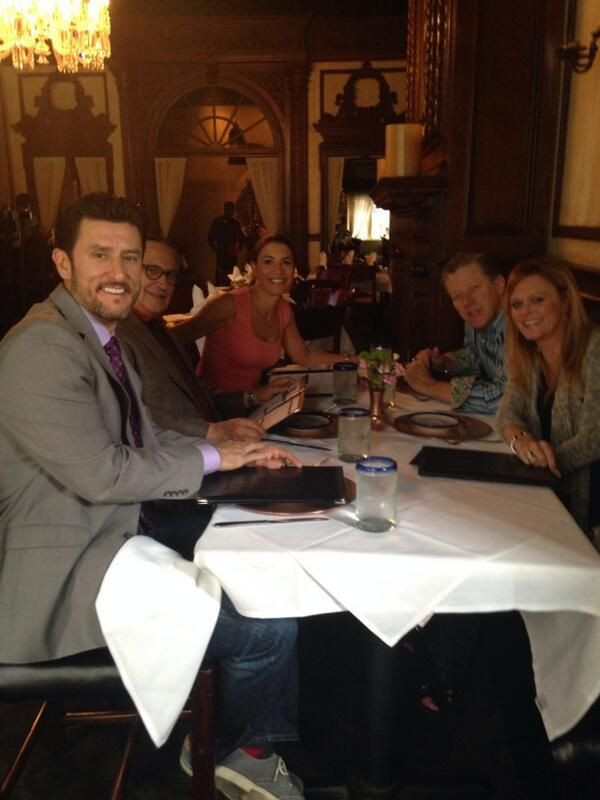
On the eve of his induction into the Latino Baseball Hall of Fame, Los Angeles Dodgers broadcaster Nomar Garciaparra was given a message by his Hispanic Mother, “Your father is in tears. He’s so proud of you.” Sure there are other honors in the sport of baseball that arguably are bigger than this, but not in the Garciaparra family.
“That was big. I can’t remember any time I have ever seen him like that. It was so huge for me.” An emotional Nomar recalled. “It meant the world to me.”
Garciaparra, 41, is one of the greatest Latino baseball players of all time. He was a six time all-star playing shortstop and first base for the Boston Red Sox and Los Angeles Dodgers, respectively. He was the unanimous 1997 Rookie of the Year and holds multiple MLB rookie records. His 10 RBIs in a game are the most in baseball history by a shortstop and Garciaparra finished second for the AL MVP award in 1998.
Recently, Nomar was inducted into the Boston Red Sox Hall of Fame and rumor has it that a place in Cooperstown awaits him as well. He lives on the beach with his Olympic gold medal winning wife and their three beautiful children. Literally, life could not get much better, but it wasn’t always like that for Nomar. Like many Latino’s in the United States, Garciaparra’s journey in life was fraught with peril, struggles, discrimination and triumph. He addressed his ups and downs growing up as a Latino in Los Angeles with us and credited his culture, family and tradition for keeping him grounded.
Latin Times: Here in Los Angeles, you have a legendary status as a baseball player in the Latino community. For those that don’t know, you were also born here, are you a first or second-generation immigrant?
Nomar Garciaparra: I’m one and a half. My father was born in raised in Mexico in Guadalajara. My mother was born here in California, but both of her parents were born in Guadalajara as well. That’s why I say I’m one and a half. All of my family is from Guadalajara on both sides of my family.
Obviously there is such a big Latino community here in Los Angeles; it’s your culture. Understanding growing up and being surrounded by it. I don’t speak Spanish fluently. I understand quite a bit of it. When my father and mother came over, their parents just spoke Spanish. As they were growing up, they were looked at as dumb for not being able to speak the language. Or held back in school. You were treated differently as well. They didn’t want that for their kids. Education was important for their children, so they made sure we learned English so we would not be treated like that in school. We learned English first and foremost for our education, but I always tell people, there is more to being Latino than just the language: it’s the culture. It’s knowing the music, the food, and most importantly, it’s about family.
It’s the culture I experienced. When I’m around my family and I go back to the house and am surrounded by all my aunts and uncles in the house, Spanish is all you hear. So I understand it. A lot of them will talk to me in Spanish and I will answer them back in English. They understand English they way I understand Spanish, and that’s the way we would communicate. I never felt that that was an issue when surrounded by my aunts and uncles and my grandparents I always felt a part of the Mexican culture. When I go back to Mexico I feel at home, I don’t feel like I’m in a foreign country, I feel fine and that’s because of the way my parent’s brought me up.
LT: Did your father experience any struggles coming to America from Guadalajara?
NG: He definitely had struggles. He experienced discrimination while over here and that is why myself and my brothers don’t speak Spanish fluently. When he came over, he didn’t speak the language and he was discriminated against and looked at as unintelligent, because he didn’t speak English. I’ve experienced it as well. I went to school in the south, in Georgia, and going over there is a lot different, especially if you’re Hispanic.
LT: In your career and in your life, did you ever experience any discrimination because of your Latino background?
NG: Absolutely. I know what it’s like. There are a lot of people who dealt with it a heck of a lot worse than I did, but I definitely experienced what it was like. It’s unfortunate that there’s still places in this country where it’s still like that.
LT: You have children of your own now, twin girls and a son. In contrast to your upbringing, are your kids going to learn to speak Spanish and about their Mexican heritage?
NG: A little bit. We have discussed getting them a tutor, they had a nanny growing up and all the Nanny speaks is Spanish, so my son understands and speaks Spanish, because that’s all she would speak to them. They have been to Mexico a few times. It’s great to vacation there. Finally having family vacations in the summer, which I’ve never had growing up because I was playing baseball. We also could never afford it growing up, so now we vacation in Mexico and I take my parents as well.
The kids get excited when they know they’re going to Mexico. A lot of the culture comes from the family and family gatherings. They’re going to be growing up with their cousins who are closer to their ages. You have such a sense and feel of the Mexican culture here in Los Angeles. The kids know they’re Mexican. At the same time, my wife isn’t so they have that side of them as well. So to answer your question, you raise them just to be good people and to respect where they come from, and to respect the family.
LT: You played for the United States in the Olympics in 1992, was there a possibility of you playing for Mexico then? Or was that not an opportunity at the time?
NG: It wasn’t even an opportunity at that time. The way I made the Olympic team was so unique. I was a freshman in college and I was the youngest player to ever be on a USA Olympic team. I walked on the team. It was a walk on open tryout, anybody could have tried out, you could have tried out. It was open to the public and I had to make it through that trial and every stage.
LT: They have since removed baseball from the Olympics. What did you think about that decision as someone who played in it?
NG: It’s disappointing, definitely. But it’s good to see that because of the WBC there is still baseball being played internationally. What’s more tragic to me is that they removed softball from the Olympics. That’s a bigger tragedy to me than baseball.
LT: Your wife played soccer in the Olympics (Nomar is married to U.S. Female Soccer Legend, Mia Hamm, who played in the 1996, 2000 and 2004 Women’s Olympics for Team U.S.A.). I read that your uncle was a very famous soccer player (His uncle is the legendary Mexican goalkeeper, Javier “Zully” Ledesma) and that your cousin plays professionally in Mexico. Are you a fan of the game?
NG: I’ve played my whole life. I played soccer since I was 5 years old all the way up until my senior year in high school. I played every position. I played midfield, I was a striker and I played defense.
LT: Do you still follow the sport today?
NG: A little bit. Whenever we get an opportunity we try and make it to some EPL games over in England?
LT: Who’s your favorite team in the EPL?
NG: Right now, I would have to say Arsenal. We know some people for Arsenal; we have some dear friends who work with Arsenal now like the trainer. Liverpool is owned by some of the owners of the Red Sox, so we cheer for them as well. I used to be a big Liverpool fan because I was a huge Michael Owen fan. I then got to know Michael Owen and that was even cooler. I remember when Michael went over to Newcastle and I got to see him play against Chelsea that was a huge rivalry. Mia wants to see Barcelona do well. She had a relationship with Barcelona with the team with the club. Which is really cool.

LT: Now time for some baseball questions. You played here in Los Angeles and in Boston what is the difference between the Latino communities in both cities?
NG: Well, there’s definitely a bigger one here. No question. Not to say that it doesn’t exist in Boston, it’s there. When you really wanted to see it, that’s where Pedro Martinez came in. Like I said it was a holiday here when Fernando used to pitch here, when Pedro Martinez pitched over in Boston in Fenway Park, it was a whole other level, a whole other feeling, and a whole other vibe when he pitched and you felt it. You felt the holiday over there with all the Dominican players like Manny Ramirez, David Ortiz and Pedro.
LT: Speaking of Pedro, on the first pitch you ever saw as a batter facing him, you hit a homerun. Do you remember that?
NG: I did hit one off Pedro. Which was weird. I love Pedro, he’s a dear friend, and we’re so close. I remember hitting one and that it was odd. I felt like I shouldn’t be facing him, but playing behind him. It was weird.
LT: You are one of a handful of players who has a World Series ring, but never played an actual game in the World Series. On that 2004 team, there was a vote and Curt Schilling was quoted as saying, “We would not have been here, if it wasn’t for Nomar.” What does that mean to you?
NG: it was huge. As much as everything was being said about me over there in the media, the guys were still calling me during their postseason run. When they would win a game and were on the bus after the postseason games they would call me and say ‘did you see that?’ And I would say ‘yeah, I watched it.’ I don’t ever really watch postseason games or the World Series. I’ve only watched two World Series while I was a player. I didn’t like watching it if I wasn’t playing in it. One I watched was the New York Subway Series when the Mets and Yankees played each other because my college roommate (Jay Payton) was playing in center field for the Mets so I had to watch him play. The other one was the Red Sox in 2004 because those guys were calling me, and I was calling them telling them ‘yeah, you’re doing great.’ It was pretty cool and pretty special.
LT: Next week is the eight-year anniversary of the back-to back-to back-to back homerun game here at Dodger Stadium against the Padres. You hit a two-run walk off homerun in extra innings of that game after giving the lead back to the Padres, was that the best game you have ever played in?
NG: No question. It’s definitely one of the most memorable games I’ve ever been a part of. Especially with everything surrounding that. To me, when you have two teams who are both in contention for the post season, every game is a playoff game. Every game means so much, especially when there are two teams going at it like it was in that game.

LT: How do you think the game has changed and evolved from a Latin standpoint over the past 20 years? How would you describe the evolution of the game in regards to Latino players?
NG: There’s a lot more coming into this game. I love it. I think it’s being embraced in this game as well. You’re seeing Cuban and Dominican players. It’s their pastime over there in the Dominican, Puerto Rico as well… all different countries. It seems that the percentage of Latino players just keeps increasing year after year and that’s great to see. It’s a melting pot. Baseball brings all cultures together to go out there and play. It’s just a matter of getting the best up there no matter where you come from. For me, I just got inducted into the Latino Baseball Hall of Fame and that’s huge for me. The Latino Baseball Hall of Fame made my father tear up. That was big. I can’t remember anytime I’ve seen him to do that. It meant the world to me. My family, the support I have had, it represent them. It represents my aunts and uncles and cousins all in Mexico. It was important to me. That honor was incredible.
Playing for the Dodgers, we all know the great voice of Vin Scully, but for me being friends with Jamie Jarrin and knowing him was bigger, because that’s who I heard growing up. Hanging out with Fernando and seeing Fernando was huge for me. Those were the Dodgers I knew. My aunts and uncles were not really big sports people, but it was a holiday when Fernando was pitching. I remember going over to their house and never seeing a game on TV and all of a sudden it was ‘shhhh be quiet, Fernando is on. Now the TV is on the game is on, the radio is on. And all I heard was Jamie Jarrin’s voice. So to me, for all I knew, Jamie Jarrin was the voice of the Dodgers more than Vin Scully was because that’s who I heard when I was younger.
So now being inducted into the Latino Hall of Fame to come full circle, I know what he meant to my family and he’s in the hall of fame, so now here I am getting inducted is a pretty big honor.

LT: Do you think becoming a Latino celebrity here in Los Angeles and now being inducted into the Latino Hall of Fame has reinvigorated your Father’s pride in you and his culture?
NG: He’s always embraced it. He’s never shied away from it. We were taught that there’s more to being Mexican than just the language. I’m grateful I know those things. When I go to Mexico I’m fine. My wife always leaves it to me and when I’m there I speak Spanish a whole lot more. He’s always taken pride in that. I know when I was going to play in the WBC for Mexico that was big. I was excited to do that.
LT: You mentioned you knew Latino songs and food as part of the culture growing up, what are some of your favorites?
NG: I love Mariachi music. I love it. I go to Mariachi concerts; I get tickets and take my parents, I just love it. We like going to restaurants that have Mariachi music. That’s why, when I played here, I had ‘Carne Asada Sundays’. That’s an example of what it means to me. Why I wanted to do that here? Because that’s what the culture means to me; that’s what I grew up on and everyone loved it because that’s what it is. When you have a great meal like carne asada, you have to have the mariachis playing so I had to bring in the mariachis. I love it, that’s what it means to me.
My mom will still call me and say ‘hey what are you doing today, or what are you doing this weekend? We just got some carne asada and are firing up the grill bring everyone over’. So that’s what it is about.
LT: Thank you Nomar, and happy Hispanic Heritage month!
You can watch Nomar on Time Warner SportsNet LA where he is a broadcaster for the Dodgers and follow him on twitter @Nomar5
© 2025 Latin Times. All rights reserved. Do not reproduce without permission.





